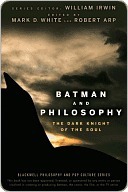
Batman and Philosophy: The Dark Knight of the Soul
William Irwin, Mark D. White, Robert Arp
Publisher
Wiley
Publication Date
5/4/2009
ISBN
9780470532805
Pages
304
Categories
Questions & Answers
Balancing Batman's commitment to justice with vigilantism and lethal force is complex. He should adhere to a moral framework that respects human life while pursuing justice. Batman's decision to not kill, even the Joker, reflects a deontological stance against taking life, emphasizing duty and respect for human dignity. However, this stance can be challenged by utilitarian considerations, where the potential to save many lives by ending the Joker's criminal activities could be seen as a net good.
To navigate this, Batman could consider alternative methods of incapacitation that minimize harm. He should also engage in dialogue with the Joker, seeking to understand his motivations and explore non-lethal solutions. Batman's vigilante status requires him to be transparent about his actions and accountable to the public, ensuring his methods align with societal values and the rule of law. This balance is delicate, requiring Batman to remain vigilant, yet judicious in his use of force, always striving to uphold justice while respecting life.
Bruce Wayne's transformation into Batman exemplifies philosophical ideas of identity, self-construction, and the role of environment and personal choices. His identity is not fixed; rather, it is constructed through his experiences and choices. The tragic murder of his parents catalyzes his transformation, revealing his environment's impact on his identity. Bruce's decision to become Batman, despite his wealth and privilege, reflects his personal choice to embrace a heroic identity. His journey from Bruce Wayne to Batman underscores the importance of self-construction, as he actively shapes his identity through his actions and choices. Additionally, his environment, including Gotham City's crime-ridden streets, plays a significant role in shaping his identity, pushing him to become a vigilante. This transformation illustrates how identity is not predetermined but shaped by a combination of personal choices and environmental influences.
Batman's struggle to lead an authentic life and maintain a conscience deeply influences his moral decisions and actions. His existential journey, shaped by his parents' murder and the bat symbol, leads him to confront the meaning of his existence and his role in Gotham. This struggle for authenticity, as defined by existentialist philosophers like Heidegger, involves being honest with oneself about what is and isn't in one's control, and taking full responsibility for one's life and actions.
Batman's authentic conscience is evident in his constant self-reflection and the acknowledgment of the absurdity and sorrow of his quest. He accepts the futility of his mission yet remains committed to it, demonstrating a profound sense of responsibility and freedom. His willingness to confront the inevitability of death and the absurdity of his situation allows him to maintain a clear moral compass, separate from external authority or societal norms.
This illustrates that authenticity is not about adhering to a specific moral code but about the individual's ability to confront the meaning of their own existence and make choices based on their own understanding of right and wrong. Batman's journey suggests that authenticity and a well-defined conscience are essential for moral integrity and heroism.
The justification of superheroes like Batman's actions hinges on ethical perspectives. Utilitarianism supports Batman's actions if they maximize overall happiness, as preventing future crimes outweighs the harm of killing the Joker. Deontological ethics, however, raises concerns about Batman's duty to uphold the law, even if it means not killing. Batman's training of Robin can be justified through virtue ethics, as it aims to develop a virtuous character. Yet, the potential for abuse of power remains, as Batman's vigilantism bypasses legal systems and could lead to vigilantism by others. Thus, while Batman's actions can be justified from certain ethical viewpoints, the potential for misuse and ethical dilemmas persist.
The relationships between Batman and his allies and enemies reflect various philosophical ideas. Batman's friendship with Superman, grounded in mutual respect and shared values, exemplifies Aristotle's concept of friendship as a bond between equals. Their differing approaches to conflict—Superman's optimism and Batman's calculated ruthlessness—highlight the complexities of friendship and moral responsibility. Batman's mentorship of Robin, like Aristotle's idea of learning by doing, shows how moral virtues can be passed down through imitation.
On the flip side, Batman's rivalry with the Joker and Two-Face underscores the nature of moral responsibility. The Joker's perceived lack of free will due to his mental state challenges the idea of moral responsibility, while Two-Face's coin-flip decisions reflect the role of chance in moral choices. Batman's refusal to kill, despite the potential for saving lives, reflects a deontological approach to ethics, emphasizing duty over consequences. These relationships collectively explore the complexities of trust, friendship, and moral responsibility in the context of superhero narratives.